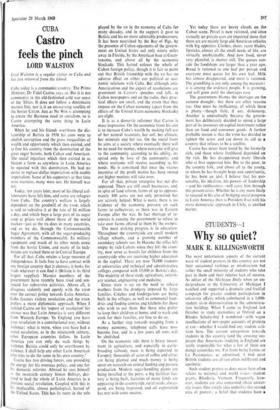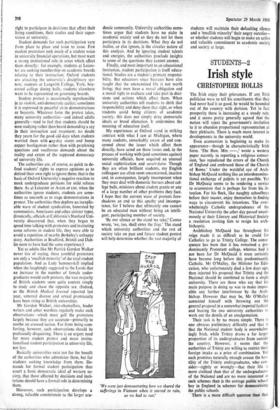Why so quiet?
STUDENTS-1
MARK R. KILLINGSWORTH
The most unfortunate aspects of the current wave of student protests in this country are not their occasional violence or misdirection but rather the small minority of students who take part in them and their relative lack of success. As editor of the Michigan Daily when an un- dergraduate at the University of Michigan I watched and supported a dramatic and fruitful campaign for greater student participation in university affairs which culminated in a 1,000- student sit-in demonstration in the administra- tion building. When I came to England last October to study economics at Oxford on a Rhodes Scholarship I wondered—with vague recollections of newspaper accounts of protests at LSE—whether I would find any student acti- vism here. The current antagonism towards students in this country (and the amusing sus- picion that Americans studying in England are really responsible for what a few of them are doing) astonishes me. Far from being Lenins or La Pasionarias, as advertised, I find most British students are all too often indifferent and apathetic.
Such student protest as does occur here often relates to national and world issues—student grants, Rhodesia, Vietnam. Frequently, how- ever, students are also concerned about univer- sity issues. One simple idea underlies this second area of protest: a belief that students have a
right to participate in decisions that affect their living conditions, their studies and their super- vision at university.
Student demands for such participation vary from place to place and issue to issue. Few student protestors seek much of a student voice in university financial operations, but most want a strong institutional role in areas which affect them directly: for 'example, students at Leices- ter are seeking membership on academic boards relating to their instruction; Oxford students are attacking the university's disciplinary sys- tem; students at Langwith College, York, boy- cotted college dining halls; students elsewhere want to be represented on governing boards.
Student protest is occasionally reprehensible in its violent, anti-democratic tactics; sometimes it is expressed in peaceful sit-in demonstrations or boycotts. Whatever form the protest takes, many university authorities—and indeed adults generally—tend to feel that students should be seen studying rather than heard demanding a say in their instruction and treatment; no doubt they yearn for the good old days when students worried them with sag-day stunts and bump supper hooliganism rather than with perplexing questions and vociferous demands about the reality and extent of the supposed democracy of university life.
The authorities are, of course, as quick to de- fend students' rights to express opinions as to defend their own right to ignore them; that is the basis of Oxford University's negative reaction to meek undergraduate petitions for mild reform there. As at Leicester or Aston or LSE, when the authorities ignore students, students are some- times so uncouth as to stage demonstrations in protest. The authorities then deplore an inexplic- able wave of student syndicalism, fomented by communists, Americans and other sinister types. (Ironically, officials at California's Stanford Uni- versity discovered that, when they began to spend time talking with protestors and instituting some reforms in student life, they were able to avoid a repetition of nearby,Berkeley's unhappy story. Authorities at Bradford, Bristol and Dub- lin seem to have had the same experience.) Yet as adults like Mr Patrick Gordon Walker never tire of saying, these youthful protestors are only a 'smallish minority' of the total student population. And as Lady Summerskill implied when she laughingly suggested to the Lords that an increase in the number of female under- graduates would curb protests, the vast majority of British students seem quite content simply to study and chase the opposite sex. (Indeed, as the British Medical Journal reported last year, venereal disease and sexual promiscuity have been rising at British universities.
Mr Gordon Walker, vice-chancellors, leader writers and other worthies regularly make such observations—which must gall the protestors largely because they are accurate—primarily to soothe an aroused nation. Far from being com- forting, however, such observations should be profoundly disquieting. There is an urgent need for more student protest and more institu- tionalised student participation in university life, not less.
Basically universities exist not for the benefit of the authorities who administer them, but for students seeking knowledge from them. De- mands for formal student participation thus assert a basic democratic ideal of western so- ciety, that those affected by decisions and insti- tutions should have a formal role in determining them.
Moreover, such participation develops a strong, valuable commitment to the larger aca-,
demic community. University authorities some- times argue that students have no stake in academic society and so they do not let them participate in its decisions. What they do not realise, or else ignore, is the circular nature of this analysis. And by ignoring student talents and energies, the authorities preclude insights to some of the questions they cannot answer.
Finally, and most important to an educational institution, student participation is itself educa- tional. Studies are a student's primary responsi- bility. But educators since Socrates have also taught that the unexamined life is not worth living; that men have a moral obligation and a moral right to evaluate and take part in deci- sions and actions which affect them. When university authorities tell students to shirk that responsibility and deny them that right, or when students avoid being citizens of academic society, this does not simply deny democratic ideals or breed alienation. It undermines the meaning of education itself.
My experiences at Oxford stand in striking contrast with what I saw at Michigan, where many students, remarkably aware of and con- cerned about the issues which affect them directly, have acted on those issues and, in the process of working with (and sometimes against) university officials, have acquired an unusual social sophistication and savoir-faire. Though they are often brilliant students, my English colleagues too often seem unconcerned, inactive and, in consequence, largely incompetent when they must deal with domestic bursars about col- lege balls, ministers about student grants or any of a large number of other problems they face. I hope that the current wave of protests fore- shadows an end to this apathy and incompe- tence, for I believe that ultimately one cannot be an educated man without being an intelli- gent, participating member of society.
'By our silence or the stand we take,' Camus wrote, 'we, too, shall enter the fray.' The stand which university authorities and the rest of society take on past and future student protest will help determine whether the vast majority of 'We were just demonstrating how we shared the sufferings in Vietnam when it started to rain. so we had to run.' students will maintain their defaulting silence and a 'smallish minority' their angry outcries— or whether students will begin to make an active and valuable commitment to academic society and society at large.







































 Previous page
Previous page